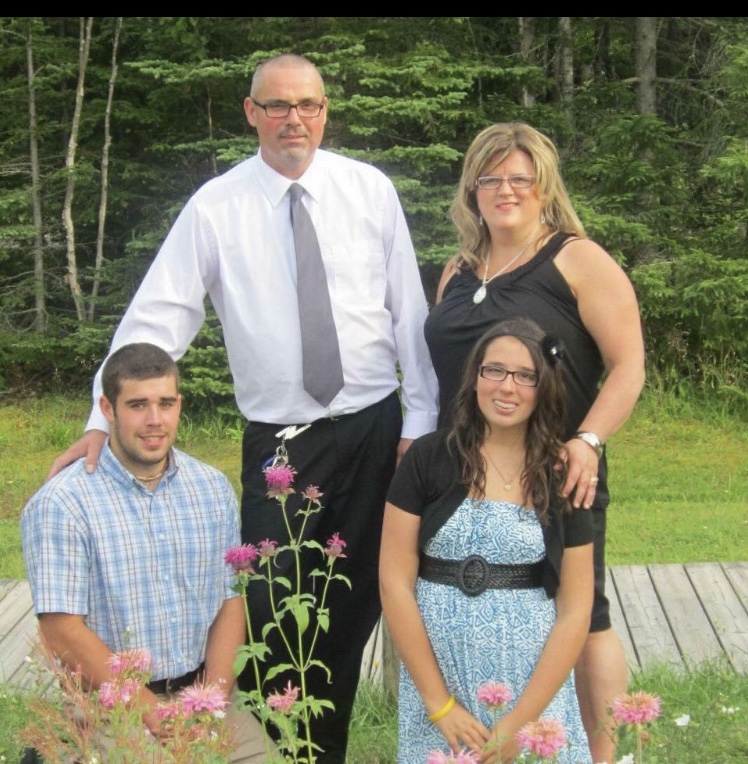When a worker is seriously injured on the job, their initial wounds are often just the first of the suffering that injury will inflict on the worker and on their family. In addition to physical pain and limitation, there are economic and social repercussions, and all of that can cause stress, anxiety and mental health challenges which in turn complicate healing and physical health. For John Mercer, the eventual impact of his physical injuries was the worst possible outcome. Threads of Life family member Margaret Campbell Mercer shares his story.

Jordan, John, Lauren and Margaret
The logic is there, that he is not coming home, but the heart still feels the crack through it.
My husband John was a meat cutter, like his brother, Sandy and Dad, Bud Mercer. John was a kind, funny, extremely interesting and intelligent man. His boisterous laugh was contagious, and he was annoying but well-loved. His favorite hockey team was the Dallas Stars.
John’s greatest accomplishment was his wife and two children. Our daughter Lauren said he was, “a great Dad and my best friend.” Jordan was only two when I met John and they absolutely adored each other. Before his injuries, he played ball, golf, hockey, and could tell you the stats of any athlete. John had a nickname for everyone and left a lasting impression.
John injured his back at work while working as a meat cutter at a grocery store. While battling the smaller obstacles of workplace injuries, John began the biggest battle of his life. John’s injuries caused physical pain, anxiety, marital distress, family disconnect, psychological illness and inevitably death.
Trying to deal with his worker’s compensation claim, John felt pressure to return to work, and at the same time experienced comments at work because of his injuries. “Returning to work caused increased anxiety, lower pain tolerance and psychological harm,” Margaret notes. “He was constantly in pain, but he did not ‘look’ like he was suffering.” The Workers Compensation Board (WCB) declared that John had a permanent medical impairment and needed to be off work. He was ordered to attend a doctor’s assessment in Halifax, a four-hour drive from home, and was booked into a hotel.
On February 12, 2013, John was found unresponsive in a hotel in Halifax. The man on the phone said he was “unresponsive.” I said, “OK, that’s fine, just wake him up. The man said, “paramedics are on their way.” I did not comprehend this and could hear sirens over the phone. At this point, several of my family members began arriving. I called my brother upset and he said, “I’m almost at your house now.” My sister was speaking to the hotel staff and looked at my other sister and shook her head no. I don’t remember anything else. Lauren told me she heard me screaming and came running upstairs to find me on the floor with my siblings holding me.
When I heard the news of John’s death, I was thrown into a state of shock and horrible pain. Someone called John’s family and his workplace, and our community was in complete shock. John’s siblings lost their baby brother. His Mom was in a nursing home and wouldn’t know her baby son had died. Little kids, strong men, and elderly people sobbed.
My family made funeral arrangements, people brought food, and I stood in a lineup feeling sad for all the people who lost their friend. All with the same opinion, “I loved John.” The funeral director said, “I almost left my career because I have never seen so many strong people broken.”
John had died due to a heart attack. After nine years of hearings, correspondence and appeals, John’s death was found to be work-related. A cardiologist stated that the chronic stress and “workplace injury contributed to Mr. Mercer’s cardiac condition and subsequent death in more than a trivial way”.
John’s death has changed me and puts great strain on relationships. The guilt and anger I feel affects not only my immediate family, but those close to me. Basic day-to-day existence, let alone meeting anyone’s expectations as a friend or family member, requires an enormous amount of energy.
I am trying to adjust as best as I can. I couldn’t make sense of the nonsense of my husband having a massive heart attack while attending doctors’ appointment for a back injury. I came across a link to Threads of Life. I was given information and invited to attend a Family Forum.
Instead of celebrating with my husband what would have been our 17th wedding anniversary I was attending a three-day forum for families affected by a workplace fatality, life-altering injury or occupational disease with my daughter. Attending the forum gave me the first bit of hope that I was not alone. Others were also suffering and John’s death, while preventable, could educate others. John’s legacy was how much he was loved and how much he loved others. He would be humbled and grateful that his kindness, humour, and impact on youths’ education would include our experience with his workplace tragedy.
Today John is missed as much as he was that day. He is remembered for his boisterous laugh and huge presence. His love for youth and learning was important and he encouraged many to return to school to pursue goals. It is important to have mutual respect and to be open to mental health concerns that may be work-related.
- In Profile: Thunder Bay Steps for Life Committee - March 7, 2025
- Help us spread the Safety Message! - March 5, 2025
- Taking the first step for Steps for Life - February 6, 2025

 Find Support
Find Support Donate
Donate